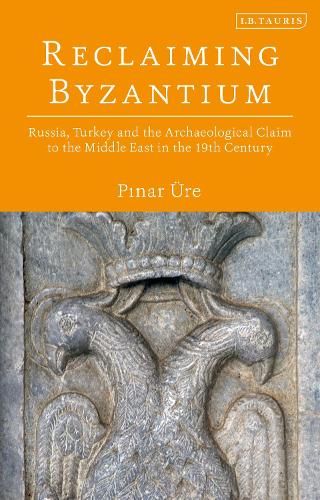
Reclaiming Byzantium: Russia, Turkey and the Archaeological Claim to the Middle East in the 19th Century
(Hardback)
Available Formats
Publishing Details
Reclaiming Byzantium: Russia, Turkey and the Archaeological Claim to the Middle East in the 19th Century
By (Author) Pinar re
Bloomsbury Publishing PLC
I.B. Tauris
20th February 2020
United Kingdom
Classifications
Tertiary Education
Non Fiction
Archaeology by period / region
Colonialism and imperialism
949.6101500909
Physical Properties
Hardback
224
Width 138mm, Height 216mm
408g
Description
There is a long-held feeling in Russia that Moscow is the true heir to the Christian Byzantine Empire. In 1894, Imperial Russia opened one of the worlds leading centres for Byzantine archaeology in Istanbul, the Russian Archaeological Institute its purpose was to stake the claim that Russia was the correct heir to Tsargrad (as Istanbul was referred to in Russian circles). This then is the history of that institute, and the history of Russias efforts to reclaim its Middle East events since in the Crimea, Syria and Georgia are all, to some extent, wrapped up in this historical framework. Ure looks at the founding of the Russian Archaeological Institute, its aims, and its place in the digging-race which characterised the late Imperial phase of modern history. Above all, she shows how the practise of history has been used as a political tool, a form of "soft power".
Reviews
Reclaiming Byzantium is a compelling and sophisticated book. Pinar re examines how both imperial Russia and the Ottoman empire approached the archaeological past, in an age of imperial competition and nationalist mobilization. This book is a model of entangled history, examining not only the relationship between the Russian and Ottoman empires over the Byzantine and Slavic past in Ottoman territories, but equally how both states and their scholarly communities had also to confront, on the one hand, the challenge of Western empires and knowledge projects (the British and French empires and their archaeological endeavors)but also the growing claims of nationalizing states in the Balkans: Serbia, Bulgaria, and Greece. It is a nuanced study of the relationships between power and knowledge, one conducted on several planes: inter-imperial competition; the relationship between the Russians and the Ottomans; and finally the role of emerging national states. res ability to tell this story from both the Russian and the Ottoman perspective provides unexpected and important insights into how both states sought to mobilize the past for political and scholarly endsand how both had to contend with unexpected and unwelcome challenges. This well-written, well-argued book will be of interest to scholars of both late imperial Russia and the Ottoman empire, people interested in the political roles archaeology played in the late nineteenth and early twentieth century, and anyone interested in the interplay of power and knowledge. * Peter Holquist, Ronald S. Lauder Endowed Term Associate Professor of History, University of Pennsylvania, USA *
The book offers a thoroughly researched, well organized, and highly readable examination of imperial Russias involvements in recovering the material culture of Byzantium during the waning years of the Ottoman Empire. Thee ideological motivations and cultural biases that influenced and guided these scientific endeavors, especially evident in the mission of the RAIC in the Balkans, are treated as matters of fact, and there is no hint of interpretation or judgment on the part of the author. Thee book exemplifies the highest quality scholarship in carrying out exactly what it sets out to do. * Review of Ecumenical Studies, Sciendo *
Author Bio
Pinar Ure completed her PhD in 2014 under the supervision of Professor Dominic Lieven at the LSE. She received her MA from the University of Pennsylvania. She is currently Assistant Professor at Istanbul Kemerburgaz University.
